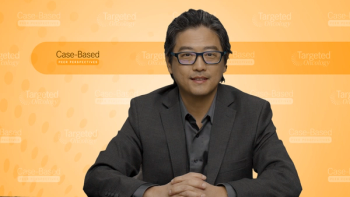
Challenges with Diversity in Clinical Trials
Joshua Richter, MD, talks about the barriers to diversity in oncology clinical trials.
In an interview with Targeted OncologyTM, Joshua Richter, MD, associate professor of medicine, division of hematology and medical oncology at the Tisch Cancer Institute, and director of multiple myeloma at the Blavatnik Family-Chelsea Medical Center at Mt. Sinai, discusses a study he wrote along with Stephen Noga, MD, PhD, and Robert Rifkin, MD, published in the Journal of the National Comprehensive Cancer Network.
The study, "Ensuring Diversity and Inclusion in Clinical Development by Leveraging Community Oncology Centers," explores the lack of diversity in clinical trials and how community oncologists can help overcome these disparities.
Transcription:
0:09 | There are a few major things that are impediments towards diversity in clinical trials. One of them is an unfortunate history that our country has had with a number of racial and ethnic groups in terms of trials and unethical behavior, things including the Tuskegee experiments, Henrietta Lacks. So there are certain groups that have concern about engaging in clinical trial efforts because of concern for unethical experimentation. Yet another issue is something that we've begun to understand at a more molecular level. Nowadays, there is an entity that used to be called benign ethnic neutropenia. And it turns out that, you know, how do we know what a normal blood count? Well, 100 years ago, we volunteered first-year medical students [and] got an average 2 standard deviations above and 2 standard deviations below. And that's a normal range. Well, back then, your average medical student was a 30-year-old White Anglo-Saxon Protestant male with no medical problems.
1:16 | It turns out that people of different racial groups will have different normal ranges for their blood counts. And more recently, it's been identified that for people of African and African American descent, there's something called the Duffy null antigen, which actually helps figure out who from a genetic basis will have a slightly lower white count, and a lower white count doesn't predispose you to more blood cancers or infections. But if a clinical trial will cite a certain level, and you're just below it, you'll be excluded. So there's now efforts to develop clinical trials that take this into account to make sure that we don't exclude patients because they have a slightly lower white count than their Asian or Caucasian counterpart.
For the community oncologist, if you are seeing a patient, and you are not sure whether or not a trial may be right or wrong for them, we're always happy to take phone calls and chat about patients. I would rather 10 phone calls in a row that don't lead to patients going on trial, rather than missing one for a patient to say, "Hey, yes, we can do this trial, don't worry, we can give them the drug, but they can follow up with you for supportive care, regular count checks, etc." And for academicians, I would say when you're designing trials, not everything needs to be done at home base.
2:35 | And I think one of the things that we're seeing with a lot of large academic centers is the incorporation of satellite sites into their paradigm. And I think they're kind of underpinning feeder sources for clinical trials. But instead of having those just send patients to home base, take the center hub, and send the trials out to the spokes saying, "May we use a central CRO, and we have patients get the trial drug there, but send the research data centrally?" And there's a lot of ways to have interplay between the hub and the spokes. It doesn't all have to be flowing inward. Let's try to get some flowing back outward.

















